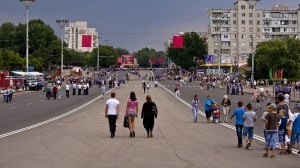Probe focus on ‘module with LeT links’ busted by Bangalore police
Blasts: 12 youth who were held accused of plotting against right-wing personalities
An alleged terror module with bases in Bangalore,Hubli,Hyderabad and Nanded,believed to be linked to the Indian Mujahideen and Lashkar-e-Toiba,has emerged as a key suspect in the Hyderabad twin blasts probe.
The module was busted last August by the Bangalore police when they arrested 15 youth and accused them of plotting attacks on right-wing personalities in Karnataka,Andhra Pradesh and Maharashtra. Last week,a chargesheet was filed against 12 of them by the NIA which took over the probe.
Sources said that other members of this alleged module,or those who may have been associated with it,were still at large and are being pursued in connection with Thursdays blasts in Hyderabad in which 16 people were killed and about 90 wounded.
A NIA team reached Bangalore Saturday to question Obaid-ur-Rahman,22,the grandson of Hyderabad cleric Maulana Naseeruddin and one of the 12 in judicial custody there,in connection with the Hyderabad probe,sources said.
The link to this module is believed to have emerged as investigators connected the dots to the alleged disclosure by IM operative Syed Maqbool that he and an associate,Imran Khan,had surveyed Dilsukhnagar in July last year to plot an attack.
Maqbool and Khan were arrested by the Delhi police last October for their alleged role in the August 1 low-intensity bomb blasts in Pune. Maqbools name figured in the Bangalore investigations as he is suspected to have known Rahman and Mohammed Akram,24,from Nanded in Maharashtra,both of whom are named in the NIA chargesheet filed last week.
Rahman is a nephew of terror-suspect Farahtullah Ghori,who is now in Saudi Arabia and in close contact with the Bhatkal brothers who founded IM. In fact,Rahman himself has allegedly been in touch with Riyaz and Iqbal Bhatkal in Pakistan,a lead that emerged in the investigations leading to his arrest.
Sources said that Rahman was not a planner but an important coordinator who appeared to be in touch with members of various modules. Unlike Maqbool,who was used to survey targets and is not believed to know much about the larger module,investigators feel Rahman is likely to possess far more information about new Indian Mujahideen modules.
Besides questioning him,sources said efforts will be stepped up to work on the Saudi connection through intelligence channels. As the arrest of Abu Jundal showed,IM handlers from Pakistan were using Saudi Arabia as a convenient third country to connect with their Indian contacts such as Ghori.
In fact,there are other Indians from Hyderabad such as Abdul Aziz Gidda and Gafoor Khan who are also based there and running these modules as directed by their Pakistani handlers. Saudi Arabia has also emerged as a recruiting ground given the large Indian population there.
Although leads from all IM-related investigations will be looked at,officials are certain that those behind Thursdays blasts are connected with the Bangalore-Hubli-Nanded module.
Sources said that the alleged July 2012 survey of Dilsukhnagar was not Maqbools first suspected link to a terror plot focused on this area.
He is also believed to have been associated with a Hyderabad terror group called the Indian Muslim Mohammadin Mujahidin (IMMM) that set off a bomb in 2002 outside the Sai Baba temple in Dilsukhnagar,located a few yards from the recent blast sites,killing three people.
IMMM was thought to have disintegrated after 2002 after the police killed one of its founders,Azam Ghauri,and the other founder,Abdul Bari,escaped to Saudi Arabia. But the IMMM,which is also suspected to be linked to Lashkar,is back under the scanner in connection with the Hyderabad blasts due to Maqbools alleged overlapping links with IM.
Police sources in Bangalore said that Maqbool,after his jail term for murder was commuted,came in contact with Rahman and Akram through the IMMM of which they were all members.
Senior Andhra Pradesh police officers,however,said they had no evidence to suggest IMMM may have been revived in any form. The IMMM was a LeT-linked terror outfit. It died after its leadership was arrested,died or fled the country, AP police sources said. – with inputs from Rahul Tripathi in Delhi





- 01
- 02
- 03
- 04
- 05


























